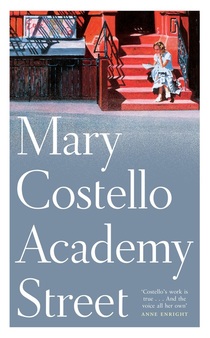
Tess Lohan is marvelling at a blackbird that has flown in through the window to peck at the wallpaper in the family farmhouse as a coffin is carried downstairs. Seven-year-old Tess finds herself intermittently forgetting that her mother has died, that she won’t be able to run and tell her what she’s observed.
We stay with Tess over the next six decades as she follows her sister to boarding school, moves to Dublin to train as a nurse and then to New York to spend the bulk of her life on Academy Street until, echoing the opening chapters, she returns to her beloved Easterfield for the funeral of her elder brother. Tess finds moments of intense joy in the little things, but she’s often lonely: her deepest loves are ephemeral, her losses profound*. Like Dear Thief, Academy Street addresses the pain of attachments, whether it is better to have loved and lost than never to have loved at all.
Occasionally she thought about retiring, moving house, taking a trip back to Ireland, but she did none of these things. There was, in her nature, a certain passivity, an acquiescence that was ill-suited to change or transformation, as if she feared ruffling fate or rousing to anger some capricious creature that lay sleeping at the bottom of her soul.
Although by no means written as a psychological case study, Tess’s character* was entirely convincing in this respect: women whose mothers died when they were children are particularly vulnerable in adulthood; those with unresolved issues around caring in childhood are often attracted to a career in the helping professions. Although Tess manages to rise above the shame of being an unmarried mother, the mixed blessings of her Catholic childhood also shaped the woman she would become.
Eschewing sentimentality, Mary Costello has managed to encapsulate almost the entire life of an ordinary woman in under 200 pages in a way that has the potential to resonate with us all. It’s an unusual format* for a novel and one that particularly interested me, given that one publisher turned down my novel Sugar and Snails on the basis that it read as “a fictional autobiography”, although I hadn’t seen it that way. Another thing that got me wondering* was the choice of title: while Tess spends the longest period of her life on Academy Street, I didn’t get a strong impression (nor did I miss not doing so) of the busy street life it had led me to expect, and her roots are back at Easterfield in rural Ireland.
This is an extremely impressive debut addressing the grief and loneliness from which no life is immune. Delightful in its use of language, it’s not an easy read emotionally, but nevertheless one I’d recommend. Thanks to Canongate Books for my review copy.
*These issues and other aspects of her writing process are explored in my Q&A with Mary Costello.





















 RSS Feed
RSS Feed





















